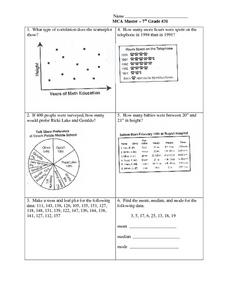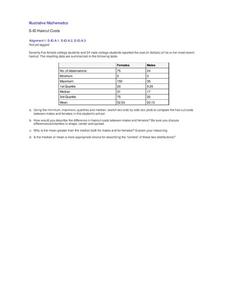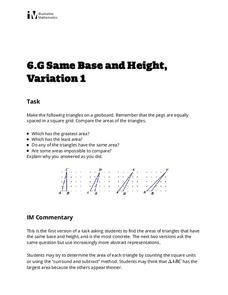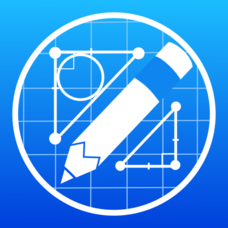Curated OER
Tin-Foil Twinkles
Students compare and discuss characteristics and properties of 2- and 3-dimensional shapes. They construct 3-dimensional paper star figures, imaginatively customizing them with art tools and craft materials. Students analyze their...
Curated OER
What's Left?
Students work together to choose a favorite food that can be divided. Using construction paper, they draw a picture of the food and take turns erasing it to determine how much of it is left. They must include all equations, fractions and...
Curated OER
Confidence Intervals: Population Proportions
In this interval worksheet, young scholars examine given data to construct a confidence interval for a specified proportion. They also identify the minimum sample size needed to support the required margin of error around the population....
abcteach
What is Your Favorite Month?
A simple worksheet that helps learners conduct a survey is here for you. In it, pupils collect data on their family and classmate's favorite months. Youngsters use tally marks in the spaces provided to keep track of the answers. Once...
Curated OER
www.tutor-usa.com worksheet
Reinforces the use of the distributive property for the pre-algebra or the beginning algebra pupil. Multiple choice and short answer questions test the use of the distributive property in expressions using solely numerical values or...
Curated OER
Data Analysis: Graphs, Charts, Tables, Statistics
In this data analysis worksheet, students interpret data in 5 problems involving graphs, tables, and scatterplots. Students construct 1 stem and leaf plot and find the mean, median, and mode of a data set.
Curated OER
Learning Ratios and Proportions Through Scale Drawings
Middle and high schoolers explore the concept of scale drawings. They discuss what a scale is and that scales provide a ratio. Pupils construct a scale drawing of their classroom using graph paper.
Curated OER
Regents High School Examination GEOMETRY 2009
The University of New York Regents High School Exam for geometry from August 2009 is comprehensive in scope with 38 questions over 22 pages. Geometers can assess their mastery of core content with a combination of multiple choice and...
Curated OER
Building Sets of 13 and 14
Compose and decompose sets of 13 and 14 and compare sets of each with your little learners. They use objects to construct sets of 13 and 14, record their answers, and compare sets in several different ways.
Curated OER
Area of a Parallelogram
Fifth graders will use geoboards to construct parallelograms. They will determine the area of a rectangle and then apply that thinking to determine the area of a parallelogram. Note: The format of this activity is much like a PowerPoint,...
Illustrative Mathematics
Haircut Costs
Who pays more for haircuts, men or women? Given quartile values, learners construct box and whiskers plots and interpret the results. They compare the mean and median, and discuss which is more appropriate under particular conditions....
Illustrative Mathematics
Words to Expressions 1
Designed as a follow-up to the lesson plan titled Watch Out for Parenthesis 1, this activity asks young learners to write an equation for the calculation described with words rather than numbers and symbols. The treasure that 5th graders...
Illustrative Mathematics
Same Base and Height, Variation 1
Four triangles are depicted for learners to construct on a geoboard. They compute and compare the areas, and so meet one of the sixth grade Common Core standards for geometry. Note that the set of triangles does not include a right...
EngageNY
Summarizing Bivariate Categorical Data with Relative Frequencies
It is hard to determine whether there is a relationship with the categorical data, because the numbers are so different. Working with a familiar two-way table on super powers, the class determines relative frequencies for each cell and...
Bytes Arithmetic
Geometry Pad+
Graphing paper, pencil, ruler, protractor, and compass, all get replaced or supplemented with this dynamic geometry application. Here, you can create, move, and scale many different shapes, as well as, explore and change their properties...
Mathematics Assessment Project
Comparing Lines and Linear Equations
Scholars first complete an assessment task on writing linear equations to model and solve a problem on a running race. They then take part in a card matching activity where they match equations and graphs of lines to diagrams of fluid...
Balanced Assessment
Oops! Glass Top
A short assessment asks participants to find the original radius required to replace a table top. The problem provides a hypothetical situation of having a segment of a broken glass table top. Pupils find the radius of the circular top...
California Education Partners
Yum Yum Cereal
Design an efficient cereal box. Scholars use set volume criteria to design a cereal box by applying their knowledge of surface area to determine the cost to create the box. They then determine whether their designs will fit on shelves,...
Bowland
DanceStar
Express dance moves mathematically. Scholars dissect dance routines and express them using mathematical notation, such as translations and rotations. They use video clips to investigate seven different dance genres.
EngageNY
Similarity and the Angle Bisector Theorem
Identifying and verifying reproducible patterns in mathematics is an essential skill. Mathematicians identify the relationship of sides when an angle is bisected in a triangle. Once the pupils determine the relationship, they prove it to...
EngageNY
Special Lines in Triangles (part 2)
Medians, midsegments, altitudes, oh my! Pupils study the properties of the median of a triangle, initially examining a proof utilizing midsegments to determine the length ratio of a median. They then use the information to find missing...
EngageNY
Special Triangles and the Unit Circle
Calculate exact trigonometric values using the angles of special right triangles. Beginning with a review of the unit circle and trigonometric functions, class members use their knowledge of special right triangles to find the value of...
K-5 Math Teaching Resources
Tangram Cutout
Challenge the spatial thinking of your young mathematicians with this printable tangram puzzle. Using different sized triangles, squares, and parallelograms, children must figure out how to fit all the shapes together to create a square.
Statistics Education Web
Saga of Survival (Using Data about Donner Party to Illustrate Descriptive Statistics)
What did gender have to do with the survival rates of the Donner Party? Using comparative box plots, classes compare the ages of the survivors and nonsurvivors. Using the same method, individuals make conclusions about the gender and...
Other popular searches
- Building Construction Math
- Construction Math Triangle
- Math on Construction Workers
- Mathematics in Construction
- Stadia Construction Math
- Staid Construction Math

























